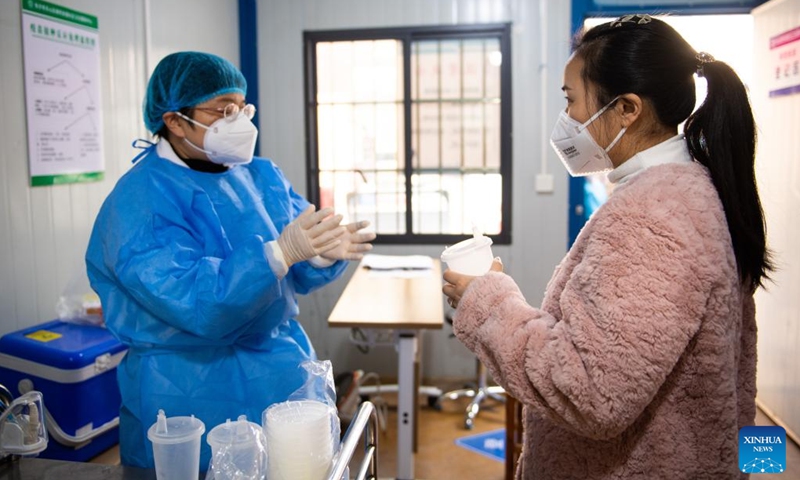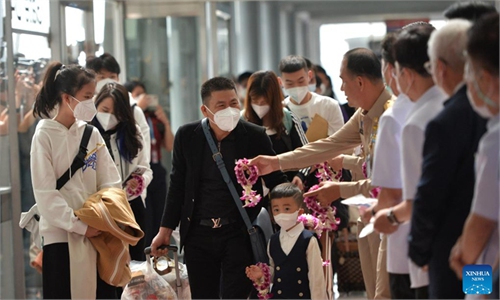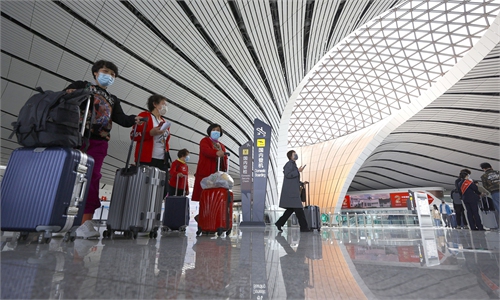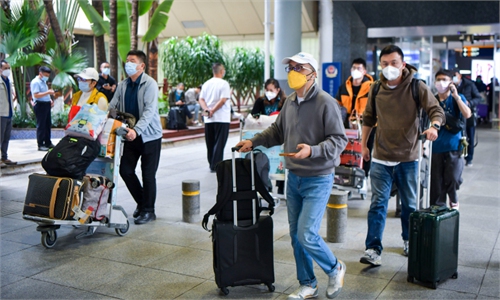China reiterates willingness to share data, cooperate in global fight against COVID-19

A medical worker (L) instructs a resident to receive inhalable COVID-19 vaccine at a community health service center in Tianxin District of Changsha, central China's Hunan Province, Dec. 22, 2022. Inhalable COVID-19 vaccines are available at many vaccine sites in Changsha now as the epidemic continues to rage. China has approved the inhalable vaccine for emergency use among populations aged 18 and above who had received two doses of traditional vaccines, but not within the previous six months.(Photo: Xinhua)
Chinese officials have reiterated China's openness and willingness to cooperate with the international community in sharing data to contribute to the fight against the COVID-19 pandemic. It came after the World Health Organization (WHO) recently said it had again asked China to regularly share epidemic data, which was hyped by some foreign media reports that questioned the transparency of China's data reporting.
In a statement on December 30, the WHO said that it had again asked for regular sharing of specific and real-time data on the epidemiological situation and data on vaccinations delivered and vaccination status after having a high-level meeting on the same day with officials from China's National Health Commission and the National Disease Control and Prevention Administration.
In a report on the same day, Voice of America cited the statement and claimed that "The rise in infections in China has triggered concern around the globe and questions about its data reporting."
When asked for a response to the WHO statement, Mi Feng, a spokesperson for China's National Health Commission (NHC), revealed at a press conference on Tuesday that the NHC had held two meetings with the WHO - on December 9 and 30, 2022 - after the country released the 10 optimized COVID-19 management measures.
He noted that China is willing to continue to work in solidarity and cooperation with the international community, including the WHO, to help the world end the pandemic as soon as possible.
Since the outbreak of the COVID-19 pandemic three years ago, China has always adhered to an open and transparent attitude, and has maintained pragmatic exchanges and cooperation with the WHO as well as countries and regions around the world, Mi said.
In January 2020, China proposed and established a technical exchange mechanism with the WHO. China's professional technical departments, relevant professional institutions and experts have maintained close communication with the WHO in the past three years. The two sides have carried out more than 60 technical meetings regarding COVID-19 prevention and control, medical treatment, vaccine research and development, and tracing of the origin of the virus. At the same time, China has co-organized more than 300 activities for technical exchanges in epidemic prevention and control with more than 180 countries and regions as well as more than 10 international organizations, sharing China's anti-epidemic experience without reservation, according to Mi.
Since the outbreak of the pandemic, China has been actively participating in international anti-pandemic cooperation, and has worked together with the international community to respond to the challenges of the epidemic, Mao Ning, a spokesperson for the Chinese Foreign Ministry, said at a press conference on Tuesday.
In response to the new changes in the epidemic situation, the Chinese authorities have released relevant information in a timely, open and transparent manner and have shared the virus genetic data for recent new COVID-19 cases in the country through the Global Initiative on Sharing All Influenza Data (GISAID), Mao noted.
Mao also noted that health experts from many countries have recently said that the strains currently affecting China have already spread to other parts of the world, and new strains may appear anywhere, so there is no need to impose special entry restrictions on travelers from China.
She reiterated that China always believes that epidemic prevention measures should be scientific and appropriate, and should not be connected to political manipulation or involve discriminatory practices. They also should not affect normal personnel exchanges and cooperation, Mao said.
Most countries have welcomed China's move to open up to travelers from all over the globe and have encouraged Chinese to travel abroad, after the country's COVID-19 battle entered a new stage. However, a small number of countries and regions, such as the US and Japan, have imposed travel restrictions on arrivals from China, citing what experts called "unnecessary" and "discriminatory" measures to defend their moves, with the real intention being to smear China's three years of COVID-19 control efforts and attack the country's system, observers said.
Global Times



